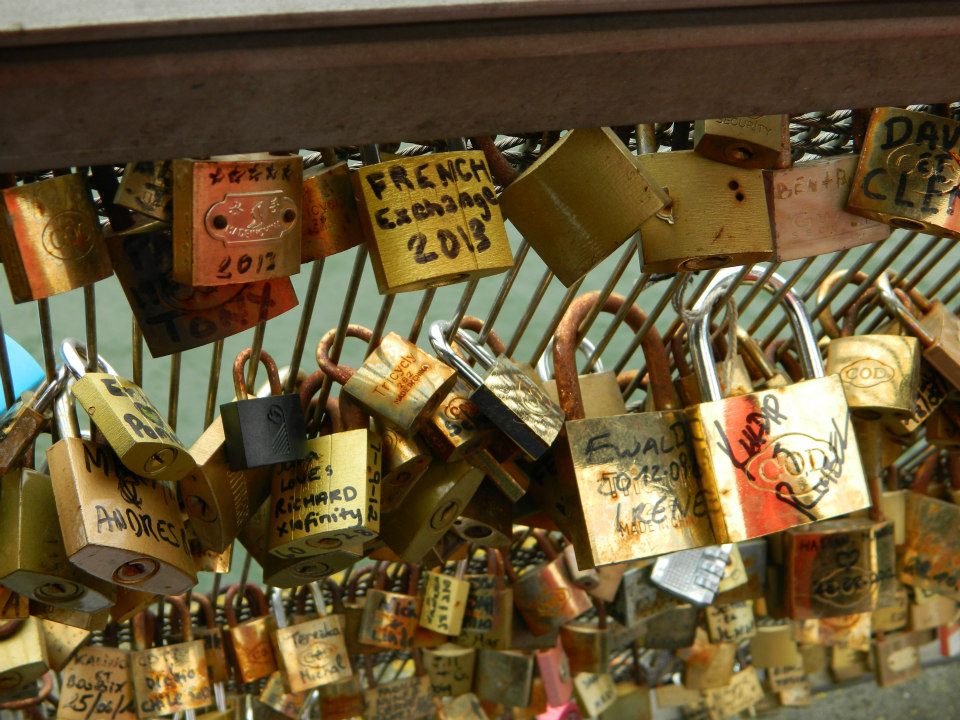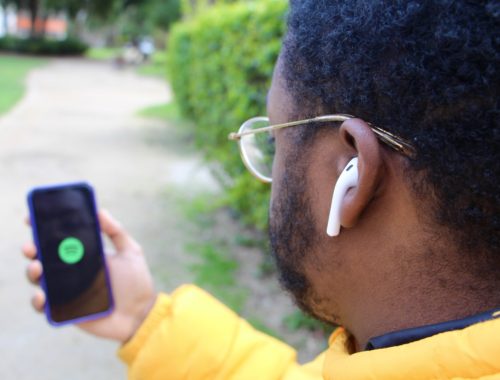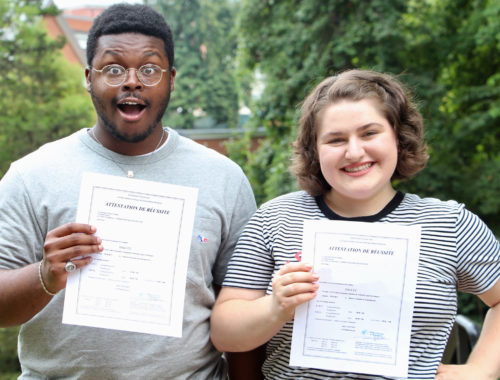
Studying Abroad in High School
My first visit to France was with an exchange program in high school. For me, it was an extremely formative experience that heavily influenced the course of my collegiate studies, career goals, and personal life. Read on to learn more about my experience and why I recommend going on an exchange if you are able.
Qualifying for the Exchange
My sophomore year of high school, I learned about an opportunity for students who had taken three years of French or more to participate in a short-term exchange program with a partner school in France. At 15 years old, having only studied French for about a year, I was already enamored with the language and culture. I met with my French teacher and asked – begged – to be considered for participation as a sophomore. My teacher told me that if I could study enough on my own to reach a satisfactory level of French proficiency, I would be able to join.
To improve my French level, I went ahead in my high school textbook, used flash cards to drill new vocabulary, listened to French music and watched French movies to improve my listening comprehension, and took every opportunity I could to speak French aloud. I achieved a basic level of proficiency and before I left for France, I was able to easily text back and forth with my corrès, or French exchange correspondent, as well as have basic conversations over FaceTime with her. I felt confident that I was ready to take on the exchange.
My Exchange Experience
The two-phase exchange began with the French students visiting their American host families in March. We had been in contact with our French students for quite some time, so I was extremely eager to meet my corrès. Despite us both having only basic communication skills in our respective target languages, we clicked right away. For two weeks, she came to class with me, went on outings with my family, and participated in pre-planned trips with her French group to places like the University of Virginia and Washington D.C. Her time with me in Virginia brought us closer and made me even more excited for my trip to France.
In April, my exchange group of 12 students and 1 teacher boarded a flight to Paris. It was my first out-of-the-country experience, and I was glad to have not only a group to travel with, but an adult to take care of any bumps in the road. The stress of navigating through Charles de Gaulle airport, getting on a bus, using the métro, and boarding a train to Épernay with our winter coats and heavy suitcases in tow was erased by my experienced teacher. Instead of worrying about the complexities of travel, I was able to focus on taking in the culture and speaking my first few words of French on French soil.
Our host families picked us up at the train station and so began the first evening of the second leg of the exchange. During the short car ride from Épernay to Chouilly, where my corrès’s family lived, I realized how much of the conversation I didn’t understand. I struggled to answer their questions and started to get nervous. It felt like I only understood every third word they were saying, and the jet lag certainly wasn’t doing me any favors. I thought back to my corrès’s first night staying with us and wondered if she felt the same way. Apprehensive but determined, I decided not to get discouraged just yet.
After about three days, I had adjusted to the time difference, spent time with my host family, been to school at Lycée Notre-Dame Saint Victor, and began to understand much more of the language than on my first evening in France. After a bit of adjustment and allowing myself to be comfortable with my abilities, it was easier to listen, speak, and understand in general. The ‘click’ I experienced was absolutely not because I’d gained substantial language skills in 72 hours. Rather, because I’d accepted that I couldn’t understand every word and stopped being embarrassed of minor mistakes, I eradicated the anxiety I was feeling and was able to take full advantage of the immersion experience.
Besides spending time in Chouilly and at my corrès’s high school, I went on several organized trips in the Champagne region of France. Some of these outings included visiting the Mercier champagne caves, climbing to the top of the Champagne de Castellane tower, touring the Cathédrale de Reims, exploring la Chocolaterie Thibault, and learning about the process of champagne making at Champagne Le Mesnil. These events were planned for us, included in the price of the exchange program, and transportation was provided. I met many welcoming people on these trips and learned so much about French culture and history. I loved getting to know the champagne region and wouldn’t have gotten nearly as much out of a visit without a home stay and planned excursions.
For the final weekend of our trip, I said a teary goodbye to my host family and boarded a train to Paris with my group. Over the course of a few days, we visited some of the most iconic Parisian locations, including Versailles Palace, the Louvre, Musée d’Orsay, Sacré Coeur, the Eiffel Tower, and the Arc de Triomphe. We ate delicious food, continued practicing our language skills, and made wonderful memories. Like the day trips in the Champagne region, everything had been planned for us in advance, the logistics were taken care of by our teacher, and nearly all the costs were covered by the exchange program fee. I had an amazing time exploring Paris and it was a wonderful way to cap off my French exchange adventure. Before I knew it, I was back in Virginia, but I felt like a changed person.
Positive Outcomes
Besides having some of the best weeks of my life, my exchange experience was valuable to me in numerous ways. First, I gained a lifelong friend in my corrès and a lasting relationship with her family. Since the exchange, she has been back to Virginia three times to stay with me and, while I was still living in the USA, I visited her in France three times as well. We see each other regularly now that I live in France! I also met lots of other students my age that I have been able to keep in touch with using social media. Staying in contact with my friend, host family, and others I met on the trip helped me to continue to improve my French skills and gave me sustained insight on modern French culture.
Completing the exchange also solidified my love of the French language, leading me to pursue opportunities in high school such as seeing movies at the Richmond French Film Festival, visiting the RVA French Food Festival, meriting first place in my county’s annual dictée (French dictation) contest four years in a row, placing first in the USA in the National French Exam, being an officer in my high school’s French Club, winning French Student of the Year, and gaining membership in the Société Honoraire de Français. All of these opportunities enriched my high school experience and ultimately led me to continuing my study of French into college and beyond. It goes without saying that the exchange transformed my life in the best possible way.
Why You Should Do an Exchange in High School
Everything is planned for you. If you do a short-term exchange trip through a program like I did, chances are that your program coordinator will take care of most everything for you. Not having to worry about securing tickets, coordinating transportation, or scheduling outings makes traveling as an adolescent much less difficult. Instead of worrying about the ins-and-outs of the trip, you can optimize your time soaking in the language and culture.
You will gain confidence in your abilities. Practicing your French in a classroom setting only may only get you so far. Actively participating in an immersion experience with native speakers will boost your confidence in your language skills and will show you exactly which aspects of your French need work. Going on an exchange while in high school can improve your competence and your morale by leaps and bounds.
You can make connections that last a lifetime. Though it takes effort and dedication to stay in touch with a corrès who lives 4,000 miles away, you have the opportunity to make a lifelong friend through your exchange. Staying in contact with international friends is easier than ever with the prevalence of smart phones, social media, and video chatting. If you play your cards right, you can score a great friend and even a place to stay if you ever find yourself abroad in the future.
You will build your resume and college application. Spending time abroad gives you hard and soft skills that employers and colleges alike appreciate. Listing skills like adaptability, communication, perseverance, foreign language proficiency, and cultural competence on applications is sure to give you an advantage over your competitors. In an increasingly globalizing world, exchange programs are a wonderful addition to your repertoire of experiences.
What if You Can’t Go on an Exchange?
Exchange programs can be expensive, time consuming, and exclusive. Not everyone has the opportunity to participate in an exchange. Luckily, exchanges aren’t the only way to improve language skills and participate in French culture.
Connect with native speakers online or using free apps. Lang8 is a community where native speakers correct posts written by language learners. With quick responses and a supportive atmosphere, you can quickly improve your proficiency using this website. Tandem and HelloTalk are free applications that connect language learners with native speakers. You can talk or text to practice your French, meet new people, and learn about French culture.
Participate in summer immersion programs. Many foreign language immersion programs for high schoolers take place over the summer. Search for a program near you to quickly improve your French-speaking skills without leaving the States!
Keep your eye out for French events at your local French organizations. The many chapters of the Alliance Française put on local events and offer classes for Francophiles of all ages. Activities include sporting event watch parties, Bastille Day celebrations, French food parties, French movie screenings, and more. Attend an event to meet new people, speak French, and learn about French and francophone culture.
Plan to study abroad in college or take a trip after high school. If you’re set on going abroad, but an exchange program isn’t feasible for you right now, start planning to study abroad in college or begin organizing a trip for after high school. In your college search, see what opportunities are available for studying abroad and make it a factor in deciding where you attend college. Reach out to the study abroad offices at your prospective schools and talk to a professional staff member about your budget and goals. Planning your own trip to France or another Francophone country for after high school is also achievable. Use the internet as a resource to create an itinerary, keeping your time constraints, budget, and personal goals for the trip in mind. You can learn just as much from a trip you coordinate on your own as from an organized exchange, with the added bonus of getting to customize your travels any way you like.
Final Thoughts
Doing an exchange in high school is absolutely a worthwhile experience if you have the ability to participate. It’s a great way to improve your language abilities and it just might change your life. In any case, seeking opportunities that allow you to interact with the French language while you’re in high school will undoubtedly positively influence your future endeavors. If you studied abroad in high school or have questions about my experience, let us know!

How Learning French Changed My Life
You May Also Like

Why Movies are an Awesome French-Learning Resource
January 15, 2020
Five Reasons Music is a Beneficial French-Learning Resource
February 12, 2020
